A Great Scientist in the field of Biology
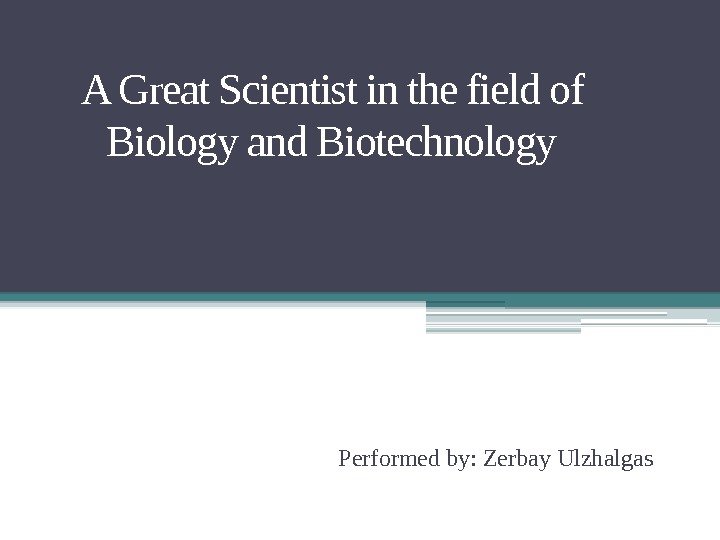
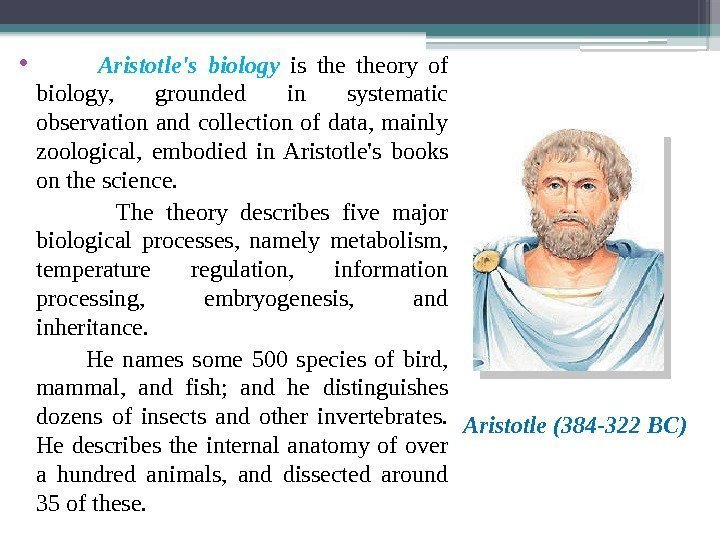
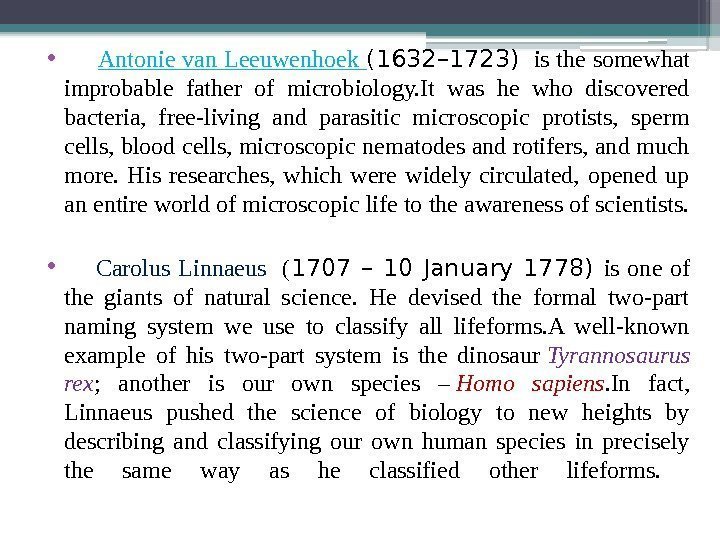
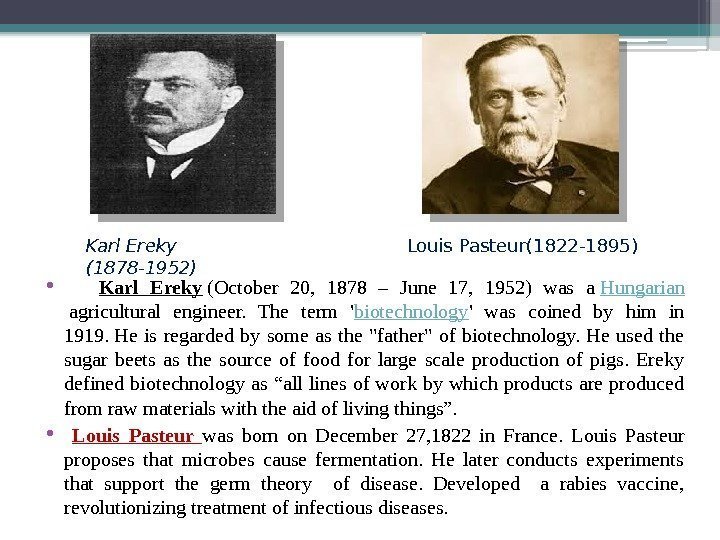
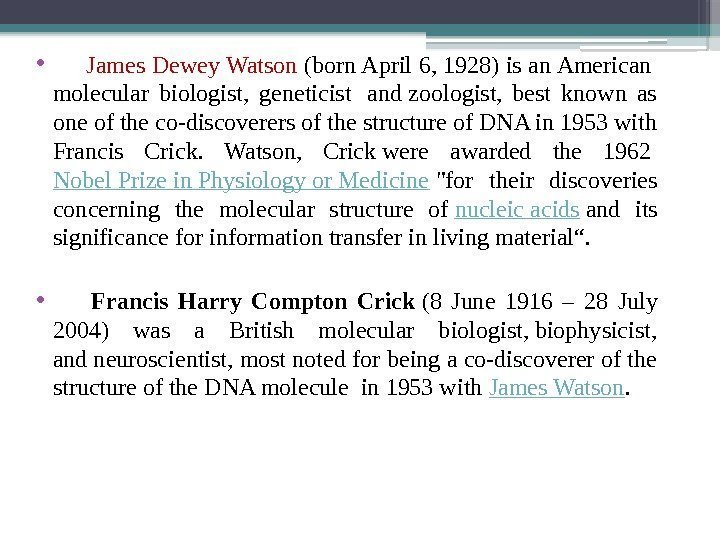
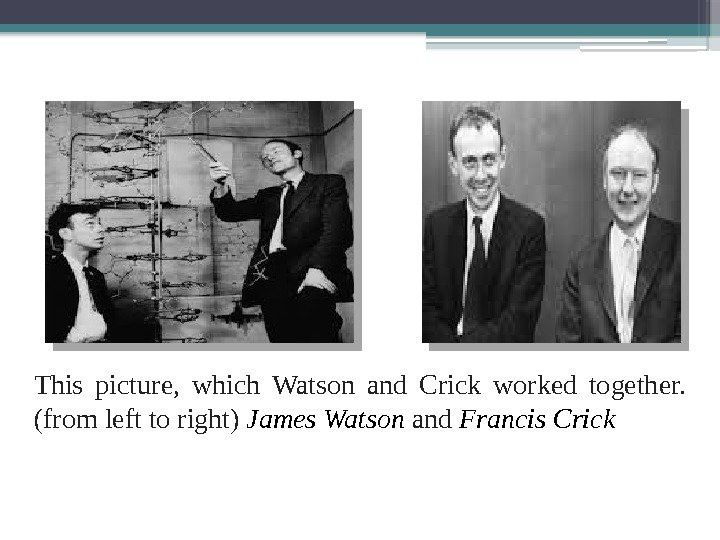
a_great_scientist_in_the_field_of_biology.pptx
- Размер: 185.0 Кб
- Автор: Ұлжалғас Зербай
- Количество слайдов: 6
Описание презентации A Great Scientist in the field of Biology по слайдам
 A Great Scientist in the field of Biology and Biotechnology Performed by: Zerbay Ulzhalgas
A Great Scientist in the field of Biology and Biotechnology Performed by: Zerbay Ulzhalgas
 • Aristotle’s biology is theory of biology, grounded in systematic observation and collection of data, mainly zoological, embodied in Aristotle’s books on the science. The theory describes five major biological processes, namely metabolism, temperature regulation, information processing, embryogenesis, and inheritance. He names some 500 species of bird, mammal, and fish; and he distinguishes dozens of insects and other invertebrates. He describes the internal anatomy of over a hundred animals, and dissected around 35 of these. Aristotle (384 -322 BC)
• Aristotle’s biology is theory of biology, grounded in systematic observation and collection of data, mainly zoological, embodied in Aristotle’s books on the science. The theory describes five major biological processes, namely metabolism, temperature regulation, information processing, embryogenesis, and inheritance. He names some 500 species of bird, mammal, and fish; and he distinguishes dozens of insects and other invertebrates. He describes the internal anatomy of over a hundred animals, and dissected around 35 of these. Aristotle (384 -322 BC)
 • Antonie van Leeuwenhoek (1632– 1723) is the somewhat improbable father of microbiology. It was he who discovered bacteria, free-living and parasitic microscopic protists, sperm cells, blood cells, microscopic nematodes and rotifers, and much more. His researches, which were widely circulated, opened up an entire world of microscopic life to the awareness of scientists. • Carolus Linnaeus ( 1707 – 10 January 1778) is one of the giants of natural science. He devised the formal two-part naming system we use to classify all lifeforms. A well-known example of his two-part system is the dinosaur Tyrannosaurus rex ; another is our own species – Homo sapiens. In fact, Linnaeus pushed the science of biology to new heights by describing and classifying our own human species in precisely the same way as he classified other lifeforms.
• Antonie van Leeuwenhoek (1632– 1723) is the somewhat improbable father of microbiology. It was he who discovered bacteria, free-living and parasitic microscopic protists, sperm cells, blood cells, microscopic nematodes and rotifers, and much more. His researches, which were widely circulated, opened up an entire world of microscopic life to the awareness of scientists. • Carolus Linnaeus ( 1707 – 10 January 1778) is one of the giants of natural science. He devised the formal two-part naming system we use to classify all lifeforms. A well-known example of his two-part system is the dinosaur Tyrannosaurus rex ; another is our own species – Homo sapiens. In fact, Linnaeus pushed the science of biology to new heights by describing and classifying our own human species in precisely the same way as he classified other lifeforms.
 • Karl Ereky (October 20, 1878 – June 17, 1952) was a Hungarian agricultural engineer. The term ‘ biotechnology ‘ was coined by him in 1919. He is regarded by some as the «father» of biotechnology. He used the sugar beets as the source of food for large scale production of pigs. Ereky defined biotechnology as “all lines of work by which products are produced from raw materials with the aid of living things”. • Louis Pasteur was born on December 27, 1822 in France. Louis Pasteur proposes that microbes cause fermentation. He later conducts experiments that support the germ theory of disease. Developed a rabies vaccine, revolutionizing treatment of infectious diseases. Karl Ereky (1878 -1952) Louis Pasteur(1822 -1895)
• Karl Ereky (October 20, 1878 – June 17, 1952) was a Hungarian agricultural engineer. The term ‘ biotechnology ‘ was coined by him in 1919. He is regarded by some as the «father» of biotechnology. He used the sugar beets as the source of food for large scale production of pigs. Ereky defined biotechnology as “all lines of work by which products are produced from raw materials with the aid of living things”. • Louis Pasteur was born on December 27, 1822 in France. Louis Pasteur proposes that microbes cause fermentation. He later conducts experiments that support the germ theory of disease. Developed a rabies vaccine, revolutionizing treatment of infectious diseases. Karl Ereky (1878 -1952) Louis Pasteur(1822 -1895)
 • James Dewey Watson (born April 6, 1928) is an American molecular biologist, geneticist and zoologist, best known as one of the co-discoverers of the structure of DNA in 1953 with Francis Crick. Watson, Crick were awarded the 1962 Nobel Prize in Physiology or Medicine «for their discoveries concerning the molecular structure of nucleic acids and its significance for information transfer in living material“. • Francis Harry Compton Crick (8 June 1916 – 28 July 2004) was a British molecular biologist, biophysicist, and neuroscientist, most noted for being a co-discoverer of the structure of the DNA molecule in 1953 with James Watson.
• James Dewey Watson (born April 6, 1928) is an American molecular biologist, geneticist and zoologist, best known as one of the co-discoverers of the structure of DNA in 1953 with Francis Crick. Watson, Crick were awarded the 1962 Nobel Prize in Physiology or Medicine «for their discoveries concerning the molecular structure of nucleic acids and its significance for information transfer in living material“. • Francis Harry Compton Crick (8 June 1916 – 28 July 2004) was a British molecular biologist, biophysicist, and neuroscientist, most noted for being a co-discoverer of the structure of the DNA molecule in 1953 with James Watson.
 This picture, which Watson and Crick worked together. (from left to right) James Watson and Francis Crick
This picture, which Watson and Crick worked together. (from left to right) James Watson and Francis Crick
